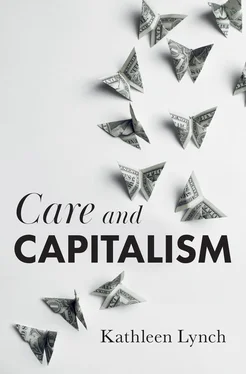Sara Cantillon, Professor of Gender and Economics at the GCU Glasgow School for Business and Society and Director of the Centre for Economic Justice, was one of the first people who encouraged me to write a book on care and capitalism. I am deeply grateful for her support throughout. Mags Crean, UCD postdoctoral scholar, social justice activist, and sociologist in the School of Education, offered ongoing guidance, inspiration and critical feedback while I was writing the book; during the isolation of Covid-19 lockdown her support was invaluable. So indeed was that of other activist-scholars, especially John Bissett, Cathleen O’Neill and Ebun Joseph.
I could not have written the book without the belief and support of John, my beloved; as always, his hands-on love and care, his wit and sense of humour kept me going during hard times. The engagement, kindness and thoughtfulness of our children, Nóra and John, and their partners, Stephen and Rose, were of greater importance than they may have known. I also appreciated the quiet encouragement of my many friends, and of my sisters and brother throughout. I am especially grateful to my sister Ann for the time and attention she gave to proofing the text at the pre-submission stage.
Many thanks too to the staff at Polity Press, and especially to Jonathan Skerrett, Senior Commissioning Editor in Sociology, Health and Social Care, for believing in the concept of the book. His courtesy, encouragement and professionalism throughout were more than I could have hoped for. I also greatly appreciated the time and attention Karina Jákupsdóttir, Assistant Editor, gave to the work during different phases of writing and planning. The copy-editing undertaken by Fiona Sewell was invaluable. I am extremely grateful for her meticulous work, and the amount of time and consideration she devoted to the text.
Although written in my name, this book is owned by the many people who have contributed to it, the scholars from different disciplines from whom I learned so much, the many people who contributed to the empirical research that underpins it, the people whose names I do not know whom I met at so many different public lectures and conferences who challenged and encouraged me, and last but by no means least, the community groups and students, inside and outside the university, from whom I learned so much.
Capitalism is the dominant political-economic system of the twenty-first century (Streeck 2016): profit-oriented companies own and control most of the world’s productive resources and capacities (Block 2018). The human cost of the concentration of wealth among so few is unsustainable (Oxfam 2021), 1something that became even more evident during the Covid-19 pandemic that took hold in 2020. 2
Although capitalism has varied in character over time and place, from merchant to industrial to neoliberal, the fundamental principles governing its operation remain constant (Patel and Moore 2018). It institutionalizes and legitimates class-based economic inequalities, frequently in deeply racialized and gendered ways. It builds on and consolidates pre-existing hierarchical, patriarchal and racial divisions of wealth and power, thereby producing and reproducing eliminable forms of human suffering. Capitalism also contributes to a corrosion of democracy and community, the encouragement of environmentally destructive patterns of consumption, and, in a world of nation states, a fuelling of militarism and imperialism (Wright 2010: 37).
As neoliberal capitalism is the dominant form of capitalism in the twenty-first century (Harvey 2005; Streeck 2016), and although it can vary in form between nation states, depending on the politics and institutional structures in place (Hall and Soskice 2001; Hall and Gingerich 2009), its fundamental operational principles and ethics remain the same. This book will focus on its multiple implications for caring.
As with all forms of capitalism, neoliberal capitalism promotes the protection of private property and the privatization of assets. In addition, neoliberalism promotes state endorsement of free market economic systems across national and global settings, and the institutionalization of market-based cultural logics and values throughout public and private organizations. The state is defined as an agent of capital by providing it with legal protections to enforce contracts, protect property rights, and protect markets in times of economic crisis (Friedman 1948; Hayek 1960, 1994). As a corollary to this, neoliberalism prescribes limited investment in public services, based on its ideal of a small, ‘cheap’ state in welfare terms. The primary purpose of education and welfare institutions is seen as conditioning and training individuals to be self-reliant, individually responsible and entrepreneurial. In this self-reliant society, the need for public services will be greatly reduced if not eliminated. To ensure the restructuring of public services, neoliberals advocate for new managerial policies and corporate-style accountability metrics and performance indicators. These are regarded as mechanisms for eliminating wastefulness, monitoring and improving performances, and maximizing ‘customer’ satisfaction (Chubb and Moe 1990; Friedman 2002).
Neoliberalism also builds on the idealization of choice in classical liberalism, prioritizing freedom over equality. In cultural terms, it is assumed that the market can replace the state as the primary producer of cultural logic and cultural value. The citizen mutates from a person with rights vis-à-vis the state to a market actor, a consumer, an economic maximizer, a free chooser. As neoliberal capitalism endorses a form of entrepreneurial individualism that is highly competitive and self-referential (Harvey 2005; Bröckling 2015; Mau 2015), and as it regards these traits as natural and desirable (Friedman 2002), it is antithetical to caring and affective justice in deep and profound ways (Federici 2012; Fraser 2016; Oksala 2016).
To create a new narrative to challenge the ethics of capitalism in its current mutation, it is necessary to move beyond the non-relational, self-referential ontology that underpins neoliberalism’s culture and politics. This means building a care-centric, relational concept of the individual person and of the wider economic, socio-political and legal order (Folbre 1994; Tronto 1993, 2013; Fineman 1995, 2004; Herring 2020).
While it would be foolhardy not to recognize the power of markets and the economy in determining the dynamics of social life, it is equally important not to place ‘capital at the gravitational centre’ of all ‘meaning making’ (Gibson-Graham, Cameron and Healy 2016: 194). A new paradigm is required, one that moves beyond the narrow capitalocentrism 3of current thinking about social change (Gibson-Graham 1996). People have a care consciousness (Crean 2018) that gives purpose and meaning to everyday life. Their relationalities are central to their identities, impacting on their ambitions and priorities (Lynch, Baker and Lyons 2009) in ways that could and should be harnessed intellectually and politically to drive egalitarian and care-led social change (Care Collective 2020).
Creating a Care-Centric Narrative
Because neoliberalism provides not only an analytical but also a normative framework for understanding the world, explaining it and prescribing how it should be, it has an ideological power that is deeply embedded culturally and politically (Boltanski and Chiapello 2005). One of the aims of this book is to help create a counter-narrative to neoliberalism, one that does not simply critique its harms but helps challenge capitalocentric modes of thought that have crowded out narratives of care and social justice in thinking about social change.
Читать дальше












